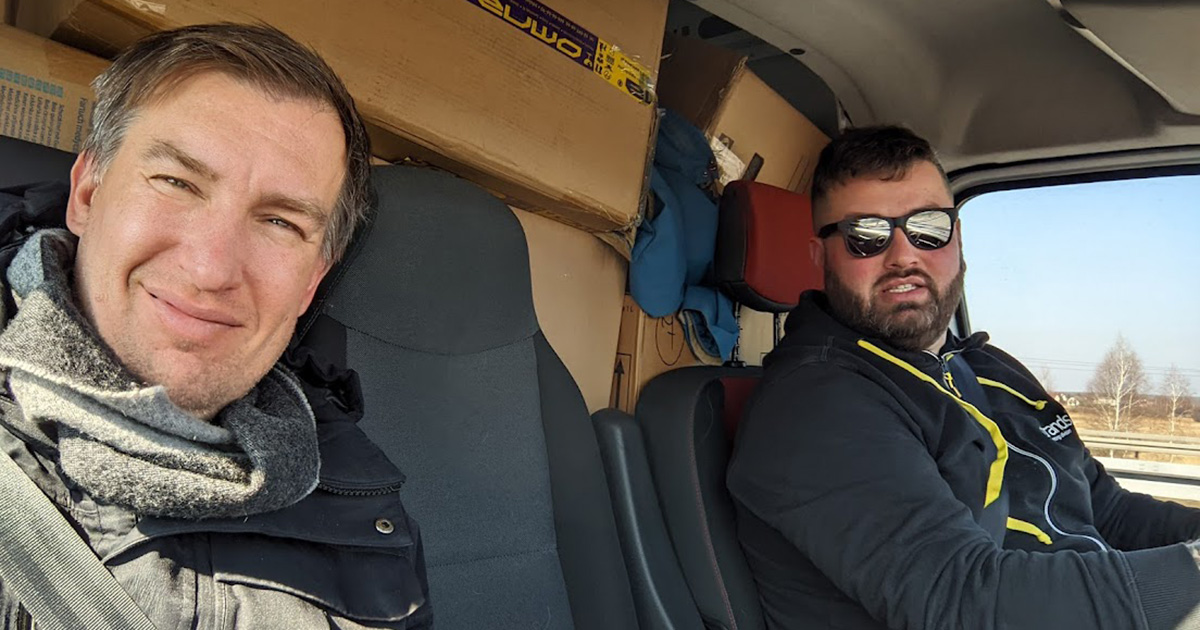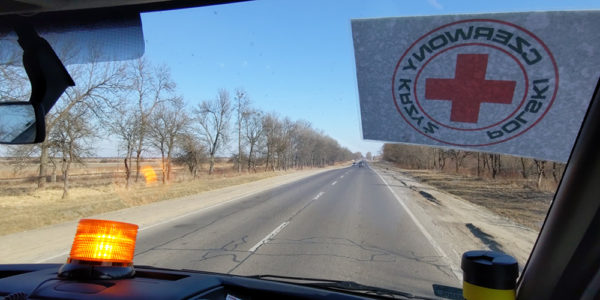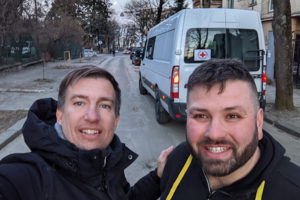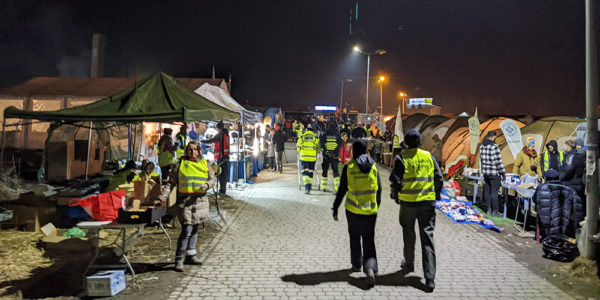Babson Professor Reflects on Trip to Poland and Ukraine

Adam Sulkowski literally wrote the book on extreme entrepreneurship. He has observed and documented entrepreneurial leaders thriving under adverse and dangerous conditions near the Afghan-Pakistan border, in the Amazon rainforest, and at a forward operating base near Mosul, Iraq.
But, the Babson College associate professor of law and sustainability hadn’t experienced anything so personal and meaningful as his recent visit to Poland and across the border into Ukraine.
“I was in disbelief during the first week of this crisis,” he said. “My dad grew up on that border. I grew up on the stories of World War II, asking, ‘Could it happen again?’ ”
A month after Russia invaded Ukraine, Sulkowski traveled to Poland, where he coincidentally met up with a cousin from Switzerland. He interviewed entrepreneurs and others, and they found ways to help—driving refugees, moving and unloading supplies, sorting donations, anything. “We couldn’t be anywhere else,” he said. “We had to be there, because it’s in our immediate living family memory.”
Their uncle, Leszek Żukowski, was 15 when he picked up arms against the Germans during the Warsaw Uprising in 1944. Sulkowski tells the family story of his uncle’s terrifying adventures in the streets of Warsaw. Although many of his generation were killed in combat or concentration camps, Żukowski survived not only those battles, but also a slave labor camp, a death march, and Dachau. He eventually became a university dean and is now in his 90s and living in Warsaw, the last in their family who recalls those days.
“He’s the only remaining person in my direct experience that I consider a hero,” Sulkowski said. “But, he would always say, ‘I’m not a hero. The heroes are dead.’ Maybe for the first time, I’m beginning to understand my uncle a bit more.”

On the road to Lviv, Ukraine
Driving into Ukraine
Sulkowski originally had planned to visit Venezuela over spring break, hoping to check off one of the remaining countries on his travel bucket list. Instead, a colleague encouraged him to reconsider and visit his family’s homeland of Poland, which was experiencing a massive refugee crisis because of Russia’s invasion of Ukraine.
For Sulkowski, Poland is a second home. He is a dual citizen, and he has studied, taught, researched, and consulted there. “I’ve got cousins all over the country, including right on that border,” he said.

Adam Sulkowski (left) and Christopher Jaworski during their time delivering supplies into Ukraine.
So, he adjusted his itinerary and just went—to observe, to report, to volunteer. “I was fairly confident that, given even a limited amount of time, I could get some interviews on the border and learn something of value to communicate,” he said.
In Poland, he traveled to Warsaw, Lublin, Medyka, Zosin, and a small town near Nowy Sącz in the south, where he met Christopher Jaworski, who converts vans into all-terrain campers. Jaworski was planning to drive supplies across the border into Ukraine and invited the Babson professor to accompany him.
Sulkowski didn’t want to get in the way or take up valuable space for supplies or refugees. He also wasn’t sure about crossing the border with a complete stranger. But, reassured by Jaworski’s collaboration with the Polish Red Cross, as well as his meticulously kept workshop, Sulkowski accompanied the ebullient volunteer on a trip into Ukraine. He is hesitant to describe specifics, because Jaworski continues to drive into Ukraine, but they made several deliveries of combat medical necessities, such as morphine, as well as bulletproof vests and other supplies, and returned to Poland in the middle of the night with refugees.
The Power of Starting
Sulkowski documented his conversations, observations, and experiences in a recent Medium post. His biggest takeaway reinforced a major lesson he explored in his book: “Do something with what you have, now.”
“The recurring theme seems to be that there’s magic in starting and letting people know what you’re doing,” he said. “There’s zero regret about actually doing anything, no matter how small.”

Volunteers help at a makeshift camp in Medyka, Poland.
The lesson applies both to entrepreneurs in extreme situations and to volunteers just trying to help in a chaotic, dangerous situation. “The point is that you’re there,” he said. “You’re providing a helping hand. You can’t measure it in terms of number of people or number of boxes. It’s about being there, and being that extra capacity, as my cousin put it.”
For Sulkowski, there was nowhere else to be. “I wanted to share the stories,” he said. “That’s the part that I thought made sense as a Babson professor. You can learn something from these people. You don’t have to go to the front line to absorb the lesson of ‘don’t wait on the sidelines.’ If something matters to you, just start, and keep asking people how you can help. Those are the big lessons that I wanted to take back.”
Back to the Future
Sulkowski began seriously traveling in 2005, when he started his teaching career and realized he didn’t know enough about the world. “The United States is 4% of the world’s population,” he said. “I had to get out of the country.”
So, he hit the road to observe and learn as much as he could. His travels to 122 of the world’s 195 countries over the next decade and a half led to his book, Extreme Entrepreneurship: Inspiring Life and Business Lessons from Entrepreneurs and Startups around the World, which was published last year.
“I wanted to share the stories. That’s the part that I thought made sense as a Babson professor. You can learn something from these people.”
Adam Sulkowski, Babson College associate professor of law and sustainability
Now, the consummate traveler is at a bit of a crossroads as he prepares for a yearlong sabbatical. He had planned to visit some of those remaining 73 countries on his to-do list, gathering more stories for the next edition of his book. But, his heart and family history are calling him back to the country he knows the most and loves dearly.
“The only question is how much time to invest there,” said Sulkowski, who is eager to help and to observe how Ukraine responds. “I think it’s going to be amazing the amount of goodwill and the amount of money that is lining up to invest and rebuild that country.”
When he returns this summer, he will likely reunite with Jaworski, the one-time stranger who became his new travel partner to war-torn Ukraine. “We’re already talking about adventures in the future,” Sulkwoski said, “maybe a rally across Africa in one of his vans.”
Posted in Community




